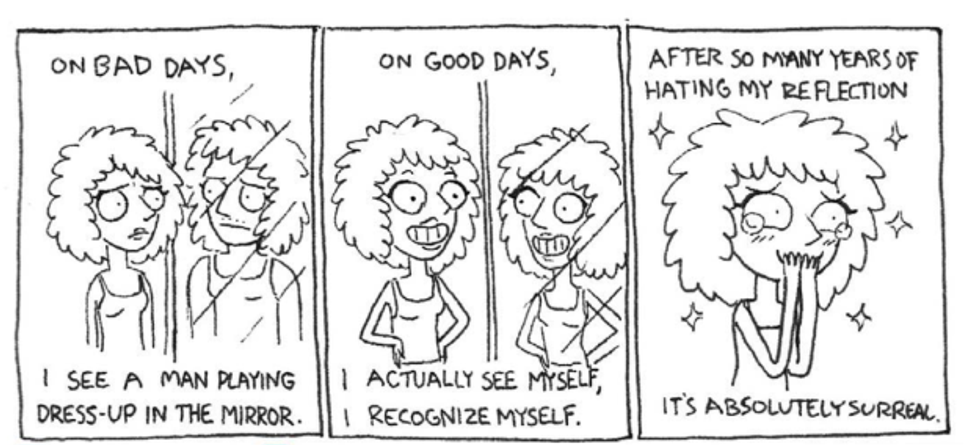This article is based on personal experiences that I have had with my best friend, Shane, and my boyfriend, Evan (pictured below.) I think it is extremely important to educate those who may be new to the topic and may be confused about how to be a proper ally to the transgender community.
1. Educate yourself on the topic.
You may find yourself asking questions about what it really means to identify as transgender. You may be wondering what the transitioning process is like. It’s better to do some homework on the topic before making assumptions and accidentally upsetting your loved one.
Before you ask your loved one questions they may be uncomfortable with, look at this website for information and resources. This website has a wide array of topics and resources including information on gender, mental health, supporting family members, questioning sexuality and gender identity.
This website has a general FAQ about transitioning, gender dysphoria and what it means to be trans, intersex, non-binary or gender non-conforming.
GLAAD has many resources and also has a FAQ about what it means to identify as transgender.
2. Realize that identifying as transgender isn’t a choice.
Some people believe that your gender is what you are born with, but that is not the case. In fact, gender and sex are two completely different things. Distinguishing between the two can be quite confusing, so it's important to know the difference.
Definition of Gender Identity from the Human Right’s Campaignarticle:
Gender Identity is one’s internal concept of self as male, female, a blend of both, or neither. It is how individuals perceive themselves, and what they call themselves. One’s gender identity can be the same or different from their sex assigned at birth. For transgender people, their birth-assigned sex and their own sense of gender identity do not match.
In contrast, sex is the biological reproductive organs that you are born with, including chromosomes and hormonal profiles. Some people are born with male sex organs, some people are born with female sex organs, some people are even born with both.
See the difference?
In general, it is hard for people to question their gender identity, and even harder to come out to loved ones and peers as trans. A person just doesn’t wake up one day and decide to transition on a whim. This person has thought about this for awhile, and every day can be a struggle. Try to put yourself in their shoes and imagine going through life feeling like you should have been born in a different body. Feeling this way can take a toll on their mental health, relationships, school, and many more aspects of their life. It is not a phase. It is not a choice.
3. Use their preferred name and preferred pronouns.
Many transgender people decide to change their birth names, and some may decide to change their name legally. Regardless if they have or haven’t changed their name legally, you should respect their preferred name and try your hardest to use it every time you address your loved one. If you are newly friends with a person who identifies as trans, don’t ever ask them what their birth name is. For some people, this can generate a ton of anxiety and bad memories.
Likewise, pronouns are very important to trans people. If you are unsure of what someone’s pronouns may be, simply ask them, “What are your pronouns?” This is not an offensive question. In fact, the person will appreciate you asking, instead of assuming. Affirming one’s pronouns is extremely important to transgender people, so you should ALWAYS use their preferred pronouns, whether they are he/him, she/her, or they/them.
4. It’s okay to make mistakes.
From personal experience, I have learned how hard it is to get used to a loved one’s pronouns and preferred name. When Shane came out to me as transgender, I struggled with using he/him pronouns and his preferred name for a month or two. It was hard at first, but now I don’t second guess it whatsoever. Just know that the slip-ups and mistakes are temporary. As time goes on, you will adjust to the preferred name and pronouns.
Although it can be embarrassing to have a slip-up, it is just that: a mistake. Just apologize, correct yourself, and move on with the conversation.
5. Avoid asking certain questions.
It’s completely fine to be curious, but specific questions/statements can come off as offensive to some people. Before you ask the question, preface it with: “Is it okay if I ask you a few questions about _____?” If the person is uncomfortable talking about the topic, then avoid talking about it until they are comfortable.
In general, avoid asking:
“How do you have sex?”
“Are you going to get a penis/vagina?”
“Why do you wear a chest binder?”
“When are you going to get started on changing your name legally?”
“If you identify as female and date a woman, does that make you gay or straight?”
These may seem like harmless questions, but they can make a person feel totally insecure and exposed.
6. Avoid making certain statements and giving out "helpful tips."
Stay away from giving out "helpful tips" and making statements such as:
"You’re so Brave.”
“I would have never known you were transgender unless you told me.”
“If you wear less makeup, you would pass as a girl so much better.”
Again, these statements and useful tips may seem helpful to you, but they are generally hurtful and offensive to others.
7. Realize that everyone’s experience is different.
There is no “right way” to transition. Some people never go through hormone therapy or a sex reassignment surgery, and some people may decide to do one but not the other. Their reasons for choosing to transition with or without hormones and surgery is their decision to make. A person does not have to start hormones or get surgery to be their identified gender. Also, try not to push your loved one towards hormones or surgery or any other transitioning process - let them decide for themselves.
8. Don't assume someone's gender identity just by looking at them.
Not all transgender people are "visibly trans" due to many factors- including where they are in their transition (if they decide to transition at all.) By assuming someone's gender, you are unintentionally hurting them. For example, when my boyfriend and I go to stores, sales associates always greet us with saying, "Hey ladies!" This upsets him, even though we both know that they are not doing that on purpose. For a general rule of thumb, you should try to be mindful of which pronouns you are using for your loved ones, along with people you may not know at all.
9. Stand up against anti-trans jokes or comments on social media and in the public.
Anti-transgender slander is extremely popular on social media. Personally, I have seen more than my fair share of videos and articles mocking transgender people on Facebook and Twitter. For example, if you see a Facebook friend sharing something that may offend a transgender person, speak up.
Similarly, while you are out in public, you may hear people (whether they are friends or strangers) make comments that poke fun at transgender people. If you hear this, you should try to correct them.
Many of the people who entertain anti-transgender slander have done little to no research on these issues, and have absolutely no education on the topic. Though it can be awkward correcting strangers in public or on social media, by speaking up you will help to reduce the stigma against transgender people.
10. Educate yourself on transgender issues.
Recently, there are laws being passed to discriminate against transgender people such as, but not limited to the HB2 law in North Carolina. These laws can include strict bathroom laws, discrimination in the workplace, and voting rights. Not only will educating yourself on these issues help you feel more connected as an LGBTQ ally, but it will also help you be more empathetic to your loved one. This website outlines some of the many issues transgender people face every day.
11. Express your support often.
Expressing your support will let your loved one know that they are not alone. Transgender youth face a lot of discrimination by peers and loved ones, which can lead to severe mental illness and suicide attempts. In fact, an article posted in December 2016 states that 40% of transgender people have attempted suicide, and the number has only gotten higher. Your loved one needs to know that you are there and you are listening, and sometimes this can be a matter of life and death. Just sending a simple text that says, “How are you doing? I was thinking about you today” could mean the world to your loved one. Although you may never understand what exactly your loved one is going through, lend them your ear to vent to and shoulder to cry on.
It will be tough. There will be laughter, tears, and misunderstandings. I promise you that it is worth it. Experiencing the transition of two of my loved ones has been an amazing experience, and has even made me a better person. It has taught me to truly accept people regardless of race, creed, or orientation. It has gotten me more involved in transgender rights and the LGBTQ community as a whole. You will begin to notice a positive change in your loved one. To see your loved one blossom into a happier, healthier person is one of the best feelings in the world. Your loved one will have good days and bad days. On the good days, they will feel like they are on the top of the world. On the bad days, they may be feeling terrible dysphoria or self-hatred and self-consciousness. Stay by their side. This person needs your support more than you will ever know. Although you can’t even begin to imagine what is going through their mind, simply telling them how much you love them and that you are there for them will surely help.
Keep an open mind and open heart. I promise you that it is worth it.






















